Utility trailers haul all kinds of things, from construction equipment to landscaping supplies to camping gear. The flooring of your utility trailer is vital not just for its durability but also for how easy it is to clean.
So, what is the best wood for a trailer floor? Read on as we listed the different types of wood available and explain what makes each one a good choice for your utility trailer.
Table of Contents
What Is the Best Wood for a Utility Trailer Floor?
1. Southern Yellow Pine (Treated and Untreated)
Southern Yellow Pine (SYP) is a wooden decking made from solid fiber used for different types of a trailer in the industry, like open-top and livestock trailers. It is an affordable option and is commonly used in North America. Due to its ability to absorb chemical treatment and durability, SYP is a good choice for a utility trailer floor. However, it is important to note that SYP is prone to warping.
SYP also tends to crack and split if not properly maintained and sealed. Additionally, it can be sensitive to moisture and may not perform as well in damp or humid environments. Despite these drawbacks, SYP is still a popular option for decking and other outdoor projects due to its strength, affordability, and availability. Consider the specific conditions and usage of the utility trailer before deciding on using SYP.
Other options like treated lumber, synthetic decking materials, or different types of wood may be more suitable for specific applications.
2. Douglas Fir
Another type of pine and high-rated softwood and the world’s best timber-producing species is the Douglas Fir. It’s commonly used for personal utility trailers due to its lightweight and easy-to-work-with properties. It is suitable for flooring as it is durable and smooth, but it is not commonly used for industrial purposes.
It can handle frequent use but may not be suitable for high-traffic areas or constant heavy loads so an extra precaution may need to be applied if you choose this softwood. Still, Douglas Fir will make an attractive flooring option for your utility trailer because of its natural grain pattern that looks neat.
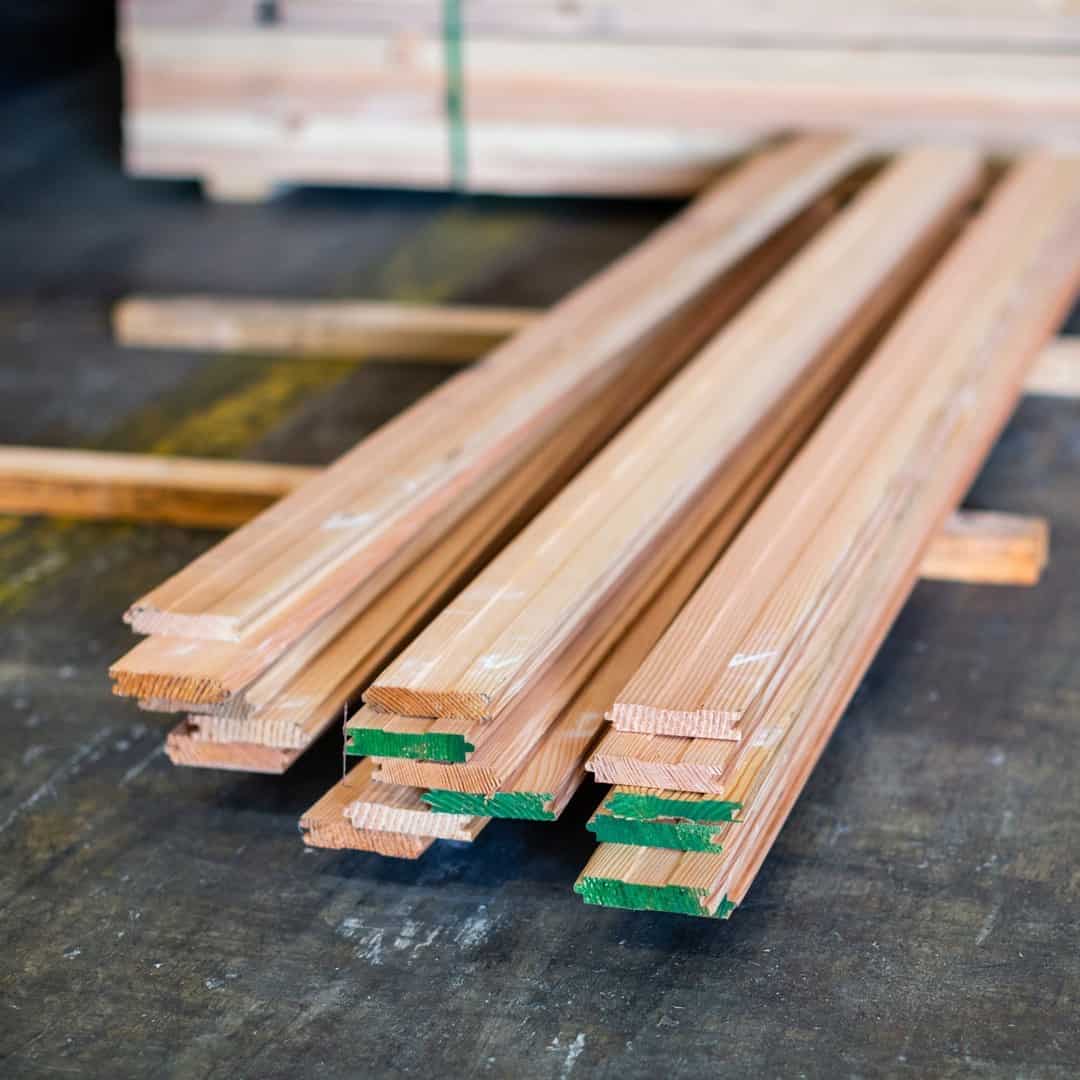
3. Blackwood Lumber / Rubber-infused Wood
Blackwood Lumber is a rubber-infused wood that can be used for utility trailer flooring. The material made in Blackwood is a highly durable hardwood with a dark reddish brown color. The darkened shade won’t show dirt and stains as easily as other flooring materials, so it’s also easy to maintain.
It’s resistant to the elements and can withstand harsh weather conditions, including UV, high winds, and heavy snowfall. In fact, according to PJTrailers, the rubber used in Blackwood is strong enough to withstand extreme wear and high impact, such as stopping bullets at indoor shooting ranges!
4. Apitong Keruing
Apitong or Keruing is a type of Southeast Asian rainforest. It can grow to 200 feet tall. Apitong trailer decking hardwood has a rough surface with tight patterned grain, so it won’t splinter or chip easily. Its durability, flexibility, and resistance to rot make it another excellent choice for your flooring needs.
Apitong is also relatively lightweight and has a high strength-to-weight ratio, which is beneficial for trailers that need to be towed. It will be easier for you to work with it even if you put heavy loads on it. In addition, Apitong has a nice golden color that will look great on your wood trailer floor!
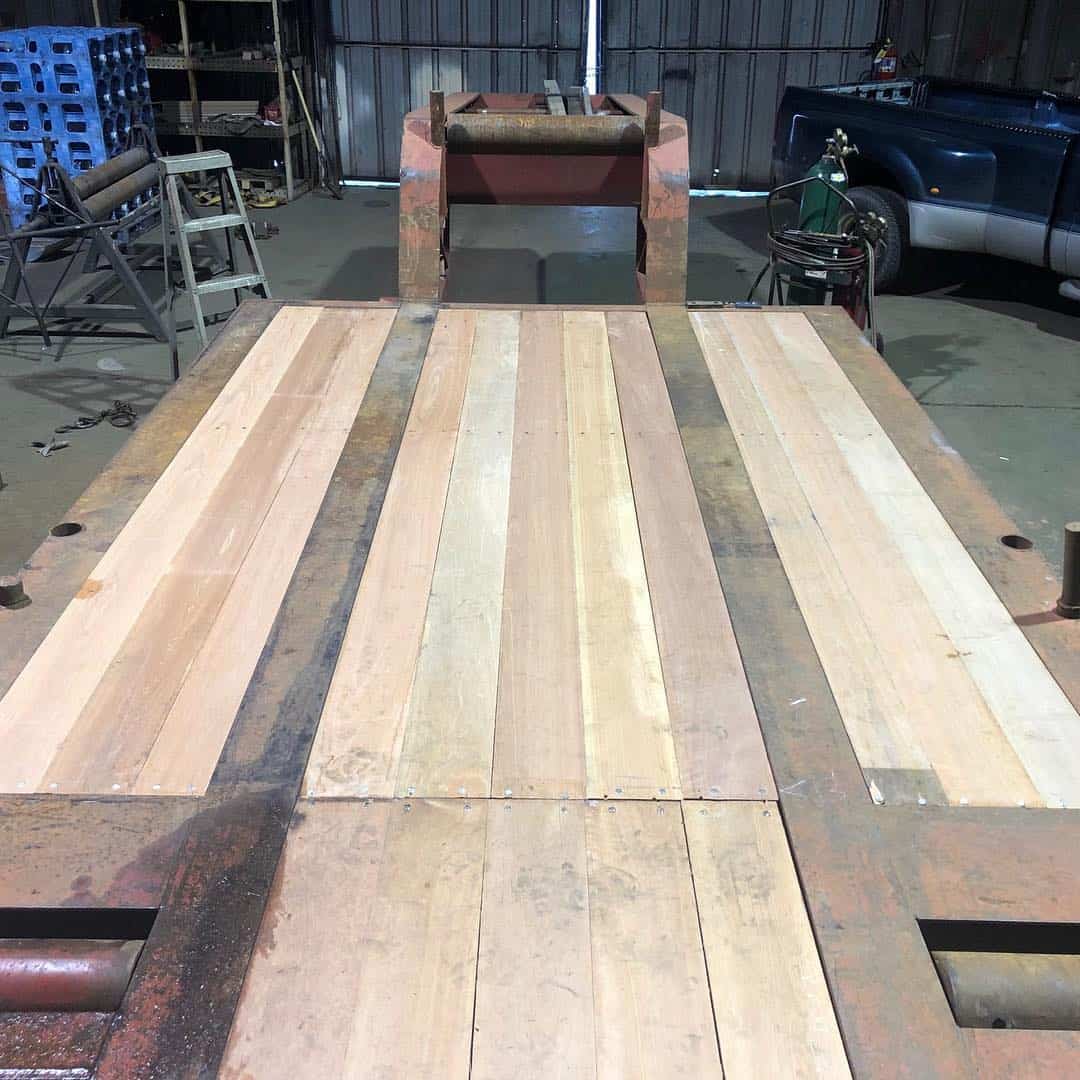
5. Brazilian Apitong or Angelim Pedra
Brazilian Apitong or Angelim Angel is a perfect substitute for Apitong Keruing. Though they have almost the same characteristics regarding strength and weight, Brazilian Apitong is 5% lighter than Keruing. They are almost similar in quality and durability.
But Brazilian Apitong or Angelim Pedra is a dense tropical wood with a smoother finish and easy to sand. It’s also resistant to water and most chemicals, so it’s ideal for environments exposed to high moisture levels or harsh chemicals. Just do not expose it too much to ensure long-lasting use.
6. Purpleheart
Purpleheart is an exotic hardwood native to the Amazon rainforest and Central America. The color of Purpleheart ranges from light brown to dark purple, with some pieces having darker streaks throughout the wood. Its lumber structure is one of the strongest and densest trees, which is why it is on our suggested list for your utility trailer flatbeds.
However, Purpleheart may show signs of a tear-out effect during the cutting process. Plus, it is so strong that you cannot use standard cutting tools to break it. Its natural internal resin may cause contamination to the tools used. So, if you buy Purpleheart, make sure to get the right size for your trailer with little to nothing needed for more cutting.
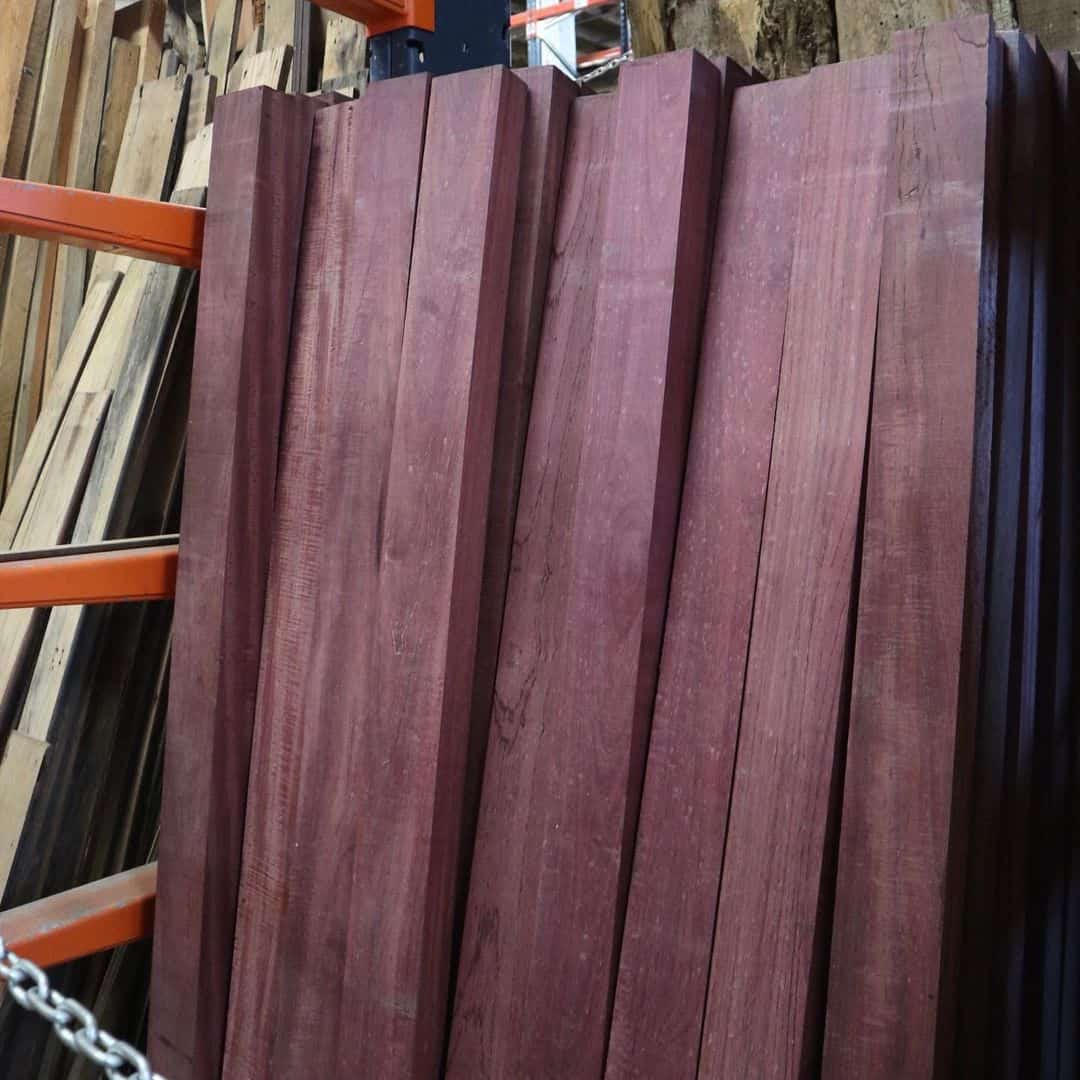
7. Oak
Oak is also suitable for utility trailer floors but is more expensive because of the challenge of growing it. But this hardwood is incredibly strong and durable, which makes it perfect for trailers that will be exposed to wear and tear over time. If you’re looking for a durable product that can withstand the elements while providing years of use and enjoyment, then oak is the answer. Two plywood decking options are red oak and white oak.
● Red Oak
Red oak is also known for its attractive grain pattern and reddish color. Its lighter color can add a nice aesthetic touch to a utility trailer, making it look more polished and professional. It’s also durable, meaning you don’t have to worry about splitting or chipping when carrying heavy loads. But compared to White Oak, Red Oak is a little softer. The best part about Read Oak is that it’s easy to finish after being cut into boards and has a natural beauty that makes any trailer look good!
One potential downside to red oak is that it is not as rot-resistant as white oak. If the trailer is exposed to water or humidity, red oak may not hold up as well over time.
● White Oak
White Oak is arguably the strongest than Red Oak, which is a little softer. It also has a high durability rating, meaning it can withstand wear and tear well. It is even more rot-resistant than red oak, making it a perfect choice for trailers that will be exposed to water or humidity. But you have to purchase authentic white oak, or else you’re wasting your money.
Like Red Oak, Authentic White Oak is a great choice for trailers that will be used to haul heavy equipment or other items. White oak has a more neutral pinkish hue than red oak, which is creamy in tone. However, it can also be stained to match the color of the trailer.
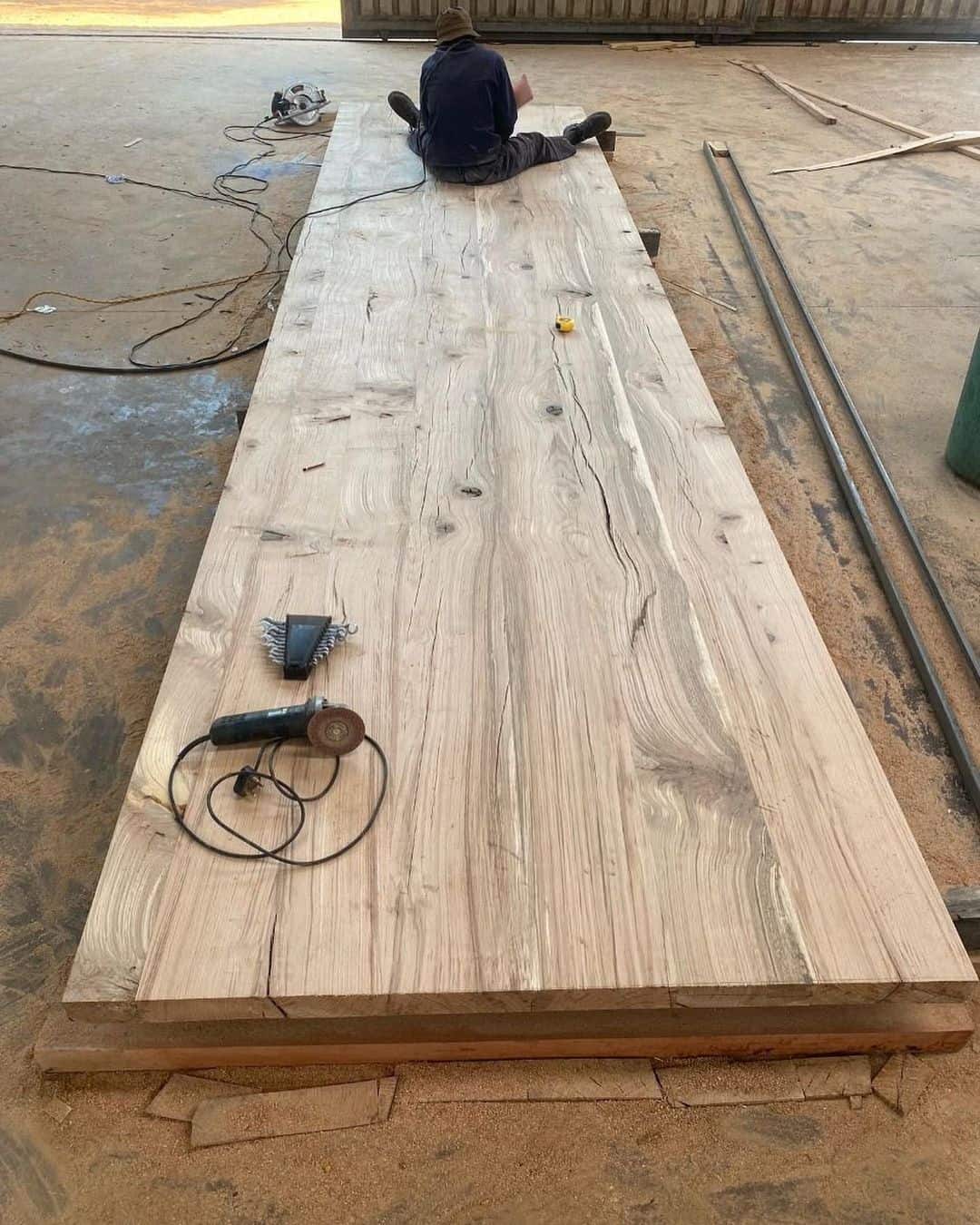
8. Cedarwood
Cedarwood is on our list of best wood for flatbed trailers. Red Cedar grows sustainably in East and West Coast America, so you won’t have to worry about its availability. We cannot say the same for other Cedar trees like Spanish Cedar and Alaskan Yellow Cedar.
But Red Cedar is abundant and cheaper, which is why it is commonly used for outdoor wood furniture. It’s not surprising that it can also be used to replace your utility trailers’ flooring. It has a pinkish-red surface. Although weather-resistant, its color may change to silver-gray when exposed to oils and other environmental factors.
9. Lumber Plywood
Lumber Plywood is one of the most popular wood options for building utility trailer floors, especially pressure-treated lumber. It’s strong, flexible, and affordable. Plywood is made of several thin layers of wood veneer glued together in alternating directions. You must use construction adhesive and carriage bolts to attach them to your trailer frame. This gives it strength and flexibility along the grain but prevents it from being as waterproof as solid wood.
If you’re looking for an affordable option for a trailer floor, plywood is a great choice. While it may not be as durable as more expensive woods like Douglas Fir or Southern Yellow Pine, it is relatively easy to replace if necessary. Two types of plywood commonly used for this purpose are Phenolic Baltic Birch and Baltic Birch Plywood.
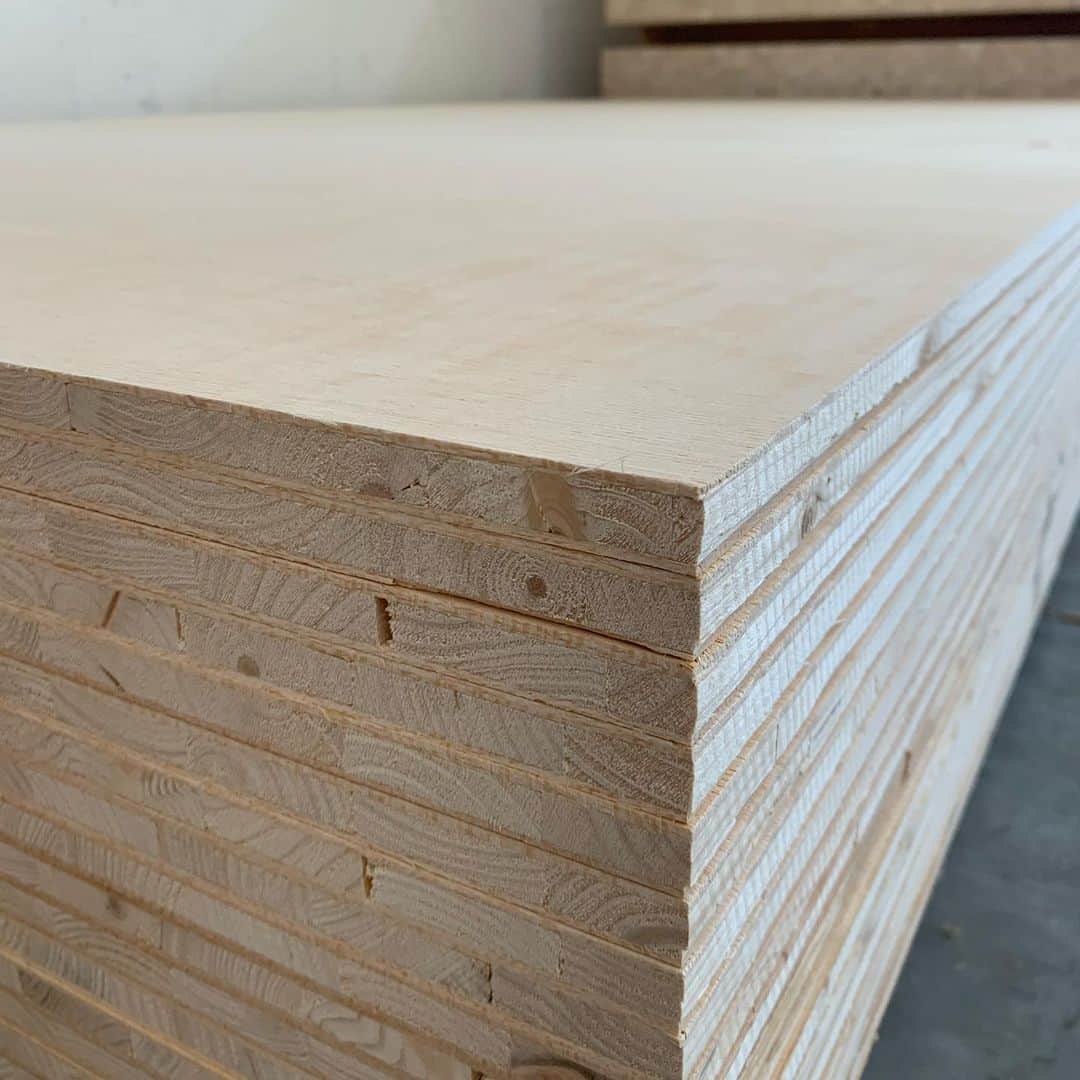
10. Shiplap
Shiplap is also typically used for utility trailer floors as an inexpensive option and can be easily found. It’s a type of woodworking that involves cutting and nailing thin strips of wood to the top of a piece of furniture, but it can also be used for floor decking. These strips are called shiplap, and the resulting look is similar to a rough-cut wood plank but without the saw marks. Shiplap gives a utility floor a unique rugged look that can make it feel rustic and cozy.
But like other wood flooring options, you will need to regularly clean and maintain it in order to keep it looking. But that should be easy because it has an easy-to-clean surface and waterproof seals around the boards. However, since shiplap is commonly used for walls, it is only good for personal utility trailers like Douglas Fir. They may be susceptible to splinters from wear and tear if used for heavy loads.
11. Hickory
Hickory is one of the American domestic hardwoods used for years in utility and recreational trailers. It’s one of the most durable woods out there, even said to be stronger than White Oak, so you’ll be able to use your trailer for years and years. In addition, you’ll have less time spent scrubbing down your trailer after every trip to clean it. But you may have difficulty working with it due to density.
And when it comes to design and patterns, you may not be able to find similar planks because of inconsistency. But if you’re planning to paint it before using it for your trailer flooring, then you’re good to go! Besides, it depends on the type of trailer. With a cargo trailer, the strength is more of a concern than the style.
Maintenance Tips for Wooden Floors in Utility Trailers
And as everyone would have said, all woods will rot and decay over time. Most times, it depends on the maintenance with how long it will last. Even the most expensive wood may turn to waste with negligence. Here are some tips to help maintain your utility trailer’s wooden floors after every use:
- Inspect your wooden floor regularly for any signs of damage or rot.
- Make sure to apply a sealant to the wood before you drive on it. This will protect against water and moisture, which can cause rot.
- Use an outdoor-grade acrylic enamel paint to waterproof the trailer bed and give it a nice finish. Make sure to sand and re-coat the paint every few years.
- Avoid dragging heavy objects onto the wood, as this can cause scratches and chips.
- Choose durable wood types such as oak or cedar for maximum life expectancy.
FAQs in Choosing the Best Wood for Utility Trailer Floor
Still, looking for more special tips or considerations in choosing the best wood for utility trailer floors? Well, here are some of the most common questions people have:
Q1: What are the pros and cons of different materials?
A: Different woods will have different levels of durability, price, and maintenance requirements. For example, pressure-treated lumber is more affordable but needs more maintenance and won’t last as long as hardwoods like Brazilian Apitong or Purpleheart. We suggest picking the right one depending on where you intend to use your utility trailer.
Q2: Do I need a moisture barrier?
A: If you’re using treated lumber and live in an area with a cold climate, use a moisture barrier like a rubber mat to protect the floor from the cold air.
Q3: What type of surface should I use?
A: If you want a surface that repels water, choose one with tightly-grained wood, like Douglas Fir. If you want a smooth surface that is easy to clean, opt for something like white oak or Southern yellow pine. For a more rustic look, go with rough oak or shiplap.
Conclusion
The best wood for a utility trailer floor is the one that best suits your needs and the one that will last. You don’t want to be replacing the flooring every year or two and wasting money on expensive materials like oak or hickory. The best idea is to go with something affordable like pine or redwood, which won’t cost much, but still have all the benefits of using natural products for your project.